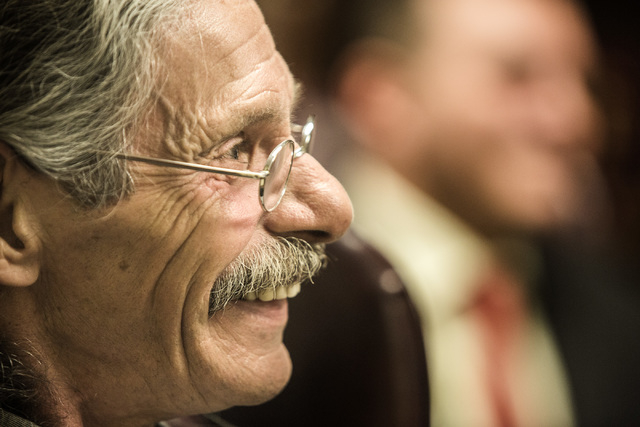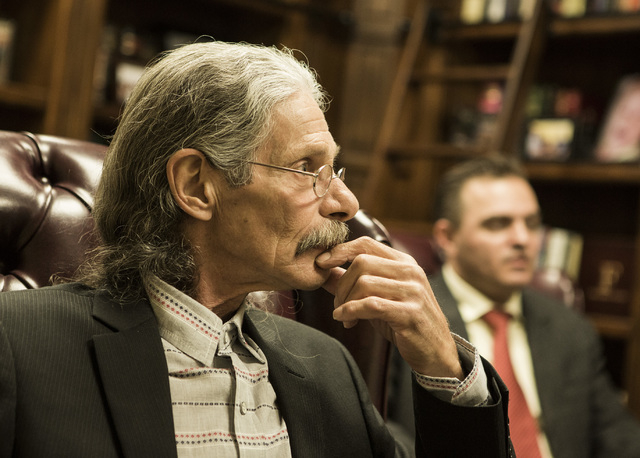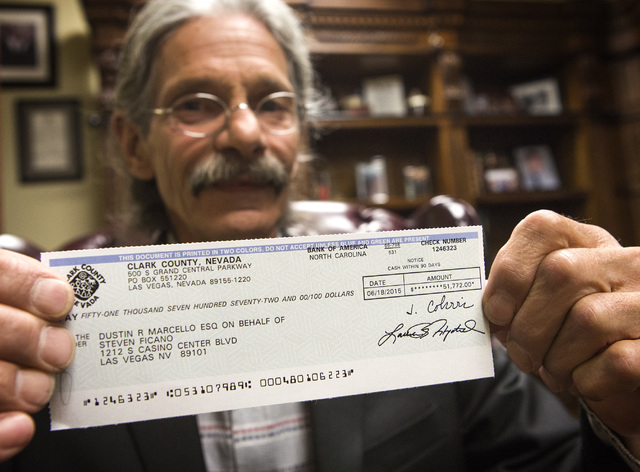Vegas man acquitted of drug crimes gets back seized cash, still fighting for guns
Nearly three years after police raided his home, Steven Ficano retrieved his cash, but he recently learned that he might have more trouble obtaining the 26 guns authorities seized.
In late May, a jury acquitted Ficano of felony marijuana charges.
As he walked out of the courtroom, Ficano turned to his lawyer.
“Where do I go to get my guns and my money?”
“You still have a civil case pending,” defense attorney Dustin Marcello told him. “They don’t have to let that go.”
After Ficano’s arrest in Oct. 2012, the Clark County District Attorney’s office filed a civil forfeiture suit to keep the nearly $52,000 in cash found in a safe and 26 weapons found in his home.
At first, the forfeiture suit seemed to wrap up quickly after the acquittal. Within days, prosecutors agreed to dismiss the civil proceedings and allow the 65-year-old to collect his cash and his guns. Part of that deal, however, meant that Ficano must forgo any interest that could have been earned in the three years the state had his money.
Attempts to reach Thomas Moreo, who runs the civil forfeiture unit with the Clark County District Attorney’s Office, were unsuccessful.
Ficano’s lawyers had a judge sign off on the deal, and Ficano received a check for $51,772 about a month after his trial ended. But when he and his lawyers called the Metro evidence vault so he could collect the guns, police weren’t so quick on the draw.
Metro spokesman Officer Larry Hadfield said anyone retrieving weapons must fill out a form and undergo a background check to ensure there are no other convictions or pending charges.
“We couldn’t in good faith release a firearm to someone,” Hadfield said. “What if there was another pending case?”
That process could take anywhere from a few weeks to five months, though Marcello said detectives in Ficano’s case may expedite the procedure.
The weapons are mostly antique lever-action rifles, collectible pistol sets and historical muskets inherited from his father.
Ficano said he has receipts for any weapons he purchased. He estimated the value of the collection between $22,000 and $25,000.
“I’ll feel a lot better once I get my weapons back,” he said.
Police told him that he could not receive his guns back if they discovered that he had an unpaid traffic ticket somewhere.
Marcello called the process “insanity,” considering Ficano has never been convicted of a crime, and police are holding property they know belongs to Ficano.
“They’re saying the bureaucracy supersedes any sense of right,” Marcello said. “You’re guilty until proven innocent. It’s the exact opposite every thing we’ve ever been taught or know about the legal system. It’s not a fair system. It’s not just. And it’s not right. There’s no due process. They just take, and the bureaucracy is bigger than what’s right or wrong.”
When police showed up at Ficano’s door, he hid nothing. He let the officers watch the World Series while they rifled through every room in his home.
He even pointed them to the safe where he kept a mix of antique currency, bills from the 1980s, 1990s and early 2000s, silver certificates and some cash he saved throughout his 36-year furniture repair career. The antique bills are lost forever, Ficano said.
He probably could have fought for the return of the weed — 68 plants and 24 pounds of finished marijuana that Ficano would use to make medical pot — but even at the time of his arrest some had been stored in the jars so long that it was moldy. Most of the plants were either male or too immature to produce buds.
For almost three years Ficano faced two felony counts, one of which could have sent him to prison for up to 10 years. Until 2012, he had no criminal record.
In Nevada, convicted felons are not allowed to have guns.
After a four-day trial, jurors took about an hour to acquit Ficano on charges of possession of marijuana and possession of marijuana with the intent to sell.
Ficano’s lawyers, Dustin Marcello and Mike Miceli, brought in three of Ficano’s neighbors — a firefighter, a former police sergeant and a school district employee — who all said they did not believe he would sell the drug.
Since Ficano was arrested, Nevada lawmakers have legalized pot dispensaries that would help prevent a situation like the one Ficano found himself in.
In 2012 medical use of marijuana was allowed, but those licensed to use it were required to grow their own at home. So when detectives knocked on Ficano’s door he let them in. He had a medical marijuana license and a note from his doctor that said he could possess more than the legal limit of 2.5 ounces of marijuana and not more than 12 plants.
Defense lawyers argued that the doctor’s waiver did not clearly state how much pot Ficano could possess, and he was never given instructions on how to grow the plant and make an edible product.
Ficano has developed arthritis and scoliosis and also used pot to alleviate lingering pain from a car accident.
After the crash, Ficano was prescribed painkillers and became addicted. Medical marijuana helped him kick that addiction, he said.
Now, with the felony charges behind him, Ficano plans to cash the check and continue on with his life.
He still has some guns the police didn’t find during the raid, and he always carries a small handgun on his hip for protection.
“I gave up fighting years ago,” he said. “I don’t want to hurt nobody. But I ain’t gonna let nobody hurt me.”
Contact reporter David Ferrara at dferrara@reviewjournal.com or 702-380-1039. Find him on Twitter: @randompoker























